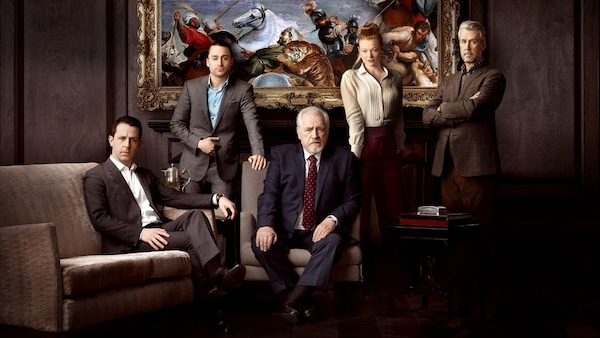Succession: Decoding the allure of HBO show among Indian audiences
For a country obsessed with business families, India has not succeeded in exploring this dynamic. Succession’s popularity then, is hardly a surprise.

Last Updated: 10.52 AM, Jul 04, 2024
Flawed families make for great narrative- the British Royal family and its controversies over decades are proof. The worldwide popularity of the HBO show Succession testifies to this. Loosely drawn from media mogul Rupert Murdoch and his relationship with his children, Succession immerses you in the unrelenting differences and cynical conflicts within the Roy family. The patriarch Logan Roy is at its centre, while the children- Connor, Kendall, Shiv, and Roman- make up the power play equation, where no one makes an open show of affection; and each is vying for a bigger slice of the Waystar Royco pie (family-owned global media company).
Succession has steadily grown on audiences in India. Parrot Analytics states that Succession has 11.2 times the average demand for TV dramas in the country. Reviews, mostly positive, also reflect a deep interest in the show and its trajectory. Succession has resonated with audiences because it touches upon business families and the conflicts that dictate the workings of family-run corporations, a space that has little or no content in India so far.

Typically, Indian popular cinema and TV shows have toed the ‘moral’ line on family dramas. When we see the super-rich comfortable in their luxurious homes, they automatically become a part of ‘ideal’ families like Sooraj Barjatya’s — very wealthy, sporting shiny outfits, accessories, and driving glitzy cars, but savagely ‘nice’. Their women dress up in traditional Indian wear, diligently conducting poojas, cook endlessly in homes swarming with domestic help, and spend their days tending to household duties. The men are caring and gentle. Almost every character is coated in kindness and bland genteel behaviour, making it hard to create or locate an antagonist.
Barjatya’s families spawned a whole lot of cult TV shows from Balaji Telefilms, which then veered into the realm of immoral romances and liaisons and an imposing, morally upright matriarch, who would generally be a strong, ever-suffering woman. Pandering to cliches, few made for a compelling watch, but most worked like a dream with audiences. They fed into the fantasy of the ‘adarsh’ (ideal) Indian parivaar (family). In terms of the ground reality of familial relationships and power dynamics within big business families, these shows and films were off the mark. For a country that has the largest number of family businesses, the role of wealth and power in shaping relationships has remained largely unexplored within Indian content. And it only takes a cursory reading of Economic Times, or simple Google searches to understand that conflict over property and succession planning, particularly in family businesses is fairly common in our country.

Succession has unmatched production value, direction, and performances that inhabit the skin of characters in an irreplaceable manner and a constantly altering storyline that is hard to predict. Its writing is impeccable as its eye for detail. It is classic Prestige TV.
But the biggest reason behind the show’s success is its unbending look at the uncomfortable elements of wealthy families. No single character is ever fully redeemed from their deeds of selfishness or degrading behaviour. Each character continues to grapple for power, attention, and never wholly hedges his/her fortunes with their father. Logan Roy (played by Brian Cox) measures his affections and favours for his children with respect to his company’s fortunes. Family decisions are made based on the best outcome for Waystar Royco. His brother, a nature lover and recluse, matters to him, but both are steadfast on their respective outlooks towards life. The children — Connor (played by Alan Ruck), Kendall (played by Jeremy Strong), Roman (played by Kieran Culkin), and Shiv (played by Sarah Snook) — also ration out their commitment to their father’s vision depending on upgrades in their job titles or wealth quotas. When the company is threatened existentially with a #MeToo scandal, Logan has no qualms about throwing Kendall under the bus; and Kendall makes a bold move by turning the tables on him. The gleam of luxury and wealth marks everything in their lives, but so does the discomfort. Thus, even in their luxury yacht, they can’t escape the harsh sunlight. They can be stuck in traffic just like any other human, the law can catch up with them, and their holiday homes can smell bad. Their mother, divorced from their father, serves them insufficient food. Succession brings to life the truth behind families — most are unhappy. It comes closer to the reality of super-rich, privileged families that we see in the news. More often than not, business interests trump love and affection.
This is perhaps why Succession has worked so well in India. The Roys have little resonance culturally. They are lily-white, their close friends as rich and white as they can be; and the only divergence is Logan’s third wife, Marcia, who happens to be Moroccan and isn’t trusted by Shiv, his daughter. In more ways than one, this cultural prejudice reflects prejudices that run deep in our behaviour- where the ‘other’ is always viewed with suspicion. What cracks so well is the universal feeling of a family being suffocating rather than supportive.

Recently, some web series and films have explored the shifting family dynamic in India too. Gullak, Home and The Great Indian Dysfunctional Family are examples. But none have touched upon family feuds and subtle conflicts of the uber-rich. Succession might be about that elusive one percent of the world that travels in private jets and personal helicopters but it doesn’t let them off the hook. Instead, it offers a ringside view into the messiness of such families, and subtly highlights the awkward strain that marks their relationships. As a viewer, it gives us a chance to gloat and laugh over their discomforts and dilemmas.
Shashi Kapoor had produced and acted in an unsung classic titled Kalyug in 1981. Shyam Benegal directed this taut, realistic drama about family secrets and it’s consequences. India’s biggest epics — The Ramayana and The Mahabharata — hinge on family conflict and differences. Zoya Akhtar tried to focus on the imbalance in business families with Dil Dhadakne Do, but the gloss took away from the story. Succession unapologetically captures the nasty side of familial conflict and chaos. That’s why it has decoded the ultimate method to showcase sibling rivalries, complex parental relationships, and the estrangement of the super privileged. Succession’s focus on the imperfect gives it the perfect connection with the audience in a country where a family dictates almost every major decision in a person’s life.
(Views expressed in this piece are those of the author, and do not necessarily represent those of OTTplay)

